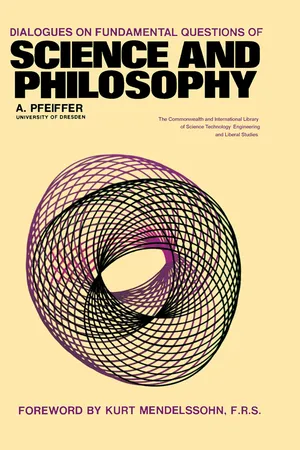
Dialogues on Fundamental Questions of Science and Philosophy
The Commonwealth and International Library: Dialogues on Fundamental Questions of Science and Philosophy
- 142 pages
- English
- PDF
- Available on iOS & Android
Dialogues on Fundamental Questions of Science and Philosophy
The Commonwealth and International Library: Dialogues on Fundamental Questions of Science and Philosophy
About this book
Dialogues on Fundamental Questions of Science and Philosophy presents a compilation of dialogues concerning the basic questions of science and philosophy. This book discusses the relationship between philosophy and science. Organized into two parts encompassing 10 chapters, this book begins with an argument that reality can be recognized objectively, but not that there is a conflict between science and faith. This text then examines the invalidity of the causality principle in the microworld of the elementary particle and by the lack of individual identity of the particles. Other chapters consider the argument that philosophy should also make use of scientific methods. This book discusses as well the extended version of the biogenetical law of Haeckel, which is also valid for the progress of the human perceptive faculty. The final chapter deals with the argument that the idea of good as a tenet for practical actions is religious in character. This book is a valuable resource for readers who are interested in the fields of science and philosophy.
Frequently asked questions
- Essential is ideal for learners and professionals who enjoy exploring a wide range of subjects. Access the Essential Library with 800,000+ trusted titles and best-sellers across business, personal growth, and the humanities. Includes unlimited reading time and Standard Read Aloud voice.
- Complete: Perfect for advanced learners and researchers needing full, unrestricted access. Unlock 1.4M+ books across hundreds of subjects, including academic and specialized titles. The Complete Plan also includes advanced features like Premium Read Aloud and Research Assistant.
Please note we cannot support devices running on iOS 13 and Android 7 or earlier. Learn more about using the app.
Information
Table of contents
- Front Cover
- Dialogues on Fundamental Questions of Science and Philosophy
- Copyright Page
- Table of Contents
- Dedication
- FOREWORD
- INTRODUCTION
- Chapter 1. First Dialogue
- FIRST PART: Science and Theory of Cognition
- SECOND PART: The Ethical Problem – Nature and Culture